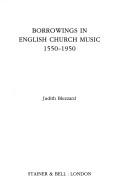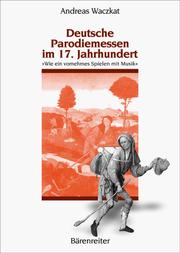| Listing 1 - 10 of 15 | << page >> |
Sort by
|

ISBN: 0852497849 Year: 1990 Publisher: London Stainer and Bell
Abstract | Keywords | Export | Availability | Bookmark
 Loading...
Loading...Choose an application
- Reference Manager
- EndNote
- RefWorks (Direct export to RefWorks)
Book
ISBN: 3657786708 Year: 2017 Publisher: Paderborn : Verlag Ferdinand Schöningh,
Abstract | Keywords | Export | Availability | Bookmark
 Loading...
Loading...Choose an application
- Reference Manager
- EndNote
- RefWorks (Direct export to RefWorks)
Die Parodiemesse der frühen Neuzeit: Erste umfassende Darstellung der Kompositionstechniken dieser weit verbreiteten Messenart. Parodiemessen des 15. und 16. Jahrhunderts wurden über mehrstimmige Vorlagen (geistlich und weltlich) der Zeit geschrieben. Wie aber genau gestaltet sich die Übernahme des Vorlagenmaterials? Darauf versucht dieses Buch Antworten zu geben. Weniger die ästhetische Würdigung des Phänomens steht im Mittelpunkt, sondern vielmehr die technisch unglaublich vielfältige, akribische und spannende Arbeit mit vielen, meist auf den zweiten Blick erst sichtbaren Finessen. Detaillierte Untersuchungen von über 60 Parodiemessen der bekanntesten Komponisten der Zeit, zeigen das breite Spektrum kompositionstechnischer Möglichkeiten der Renaissance auf.

ISBN: 3761814844 Year: 2000 Publisher: Kassel Bärenreiter
Abstract | Keywords | Export | Availability | Bookmark
 Loading...
Loading...Choose an application
- Reference Manager
- EndNote
- RefWorks (Direct export to RefWorks)
Book
ISBN: 213038160X 9782130381600 Year: 1984 Volume: vol *67 Publisher: Paris : Presses universitaires de France,
Abstract | Keywords | Export | Availability | Bookmark
 Loading...
Loading...Choose an application
- Reference Manager
- EndNote
- RefWorks (Direct export to RefWorks)
Composition (Music) --- Composition (Musique) --- Parody (Music) --- Parody in music. --- Composition (Music). --- Quotation in music --- Parody in music --- Citation dans la musique --- Parodie dans la musique
Book
ISBN: 9781351266642 1351266640 9781351266628 1351266624 9781351266635 1351266632 9781351266611 1351266616 9781138577565 1138577561 Year: 2019 Publisher: Abingdon Routledge
Abstract | Keywords | Export | Availability | Bookmark
 Loading...
Loading...Choose an application
- Reference Manager
- EndNote
- RefWorks (Direct export to RefWorks)
An essential part of human expression, humor plays a role in all forms of art, and humorous and comedic aspects have always been part of popular music. For the first time, The Routledge Companion to Popular Music and Humor draws together scholarship exploring how the element of humor interacts with the artistic and social aspects of the musical experience. Discussing humor in popular music across eras from Tin Pan Alley to the present, and examining the role of humor in different musical genres, case studies of artists, and media forms, this volume is a groundbreaking collection that provides a go-to reference for scholars in music, popular culture, and media studies. While most scholars, when considering humor's place in popular music, tend to focus on more "literate" forms, the contributors in this collection seek to fill in the gaps by surveying all kinds of humor, critical theories, and popular musics. Across eight parts, the essays in this collection explore topics both highbrow and low, including: Parody and satire Humor in rock and global music Gender, sexuality, and politics The music mockumentary Novelty songs Humor has long been a fixture of the popular music soundscape, whether on stage, in performance, on record, or on film. The Routledge Companion to Popular Music and Humor covers it all, presenting itself as the most comprehensive treatment of the topic to date.
Humor in music --- Popular music --- Comedy in music --- Humorous music --- Musical humor --- Parody in music --- History and criticism
Book
ISBN: 9783487150727 3487150727 Year: 2014 Volume: 40 Publisher: Hildesheim ; Zürich ; New York Georg Olms Verlag
Abstract | Keywords | Export | Availability | Bookmark
 Loading...
Loading...Choose an application
- Reference Manager
- EndNote
- RefWorks (Direct export to RefWorks)
Musical parodies --- Parodies (Music) --- Wit and humor [Musical ] --- Musical theater --- Opera --- Parody in music. --- Théâtre musical --- Opéra --- Parodie (Musique) --- History --- Histoire --- Théâtre musical --- Opéra --- History.
Book
ISBN: 9782753527225 2753527229 2753561834 Year: 2018 Volume: *23 Publisher: Rennes : Presses universitaires de Rennes,
Abstract | Keywords | Export | Availability | Bookmark
 Loading...
Loading...Choose an application
- Reference Manager
- EndNote
- RefWorks (Direct export to RefWorks)
Comment concevoir qu’un livret d’opéra ait pu être réécrit pour des marionnettes ou sous forme de pantomime ? Peut-on imaginer qu’une œuvre lyrique ait suscité plus de huit parodies ? Sait-on que Louis XVI et Marie-Antoinette avaient leur parodiste attitré ? Les réécritures comiques d’opéra, représentées sur les théâtres de la foire et des boulevards comme à la Comédie-Italienne de Paris et sur les théâtres privés, connaissent une vogue étonnante au siècle des Lumières. Parodier l’opéra, ce n’est pas écrire contre l’opéra, mais plutôt participer à sa promotion en jouant le double jeu de la critique et du divertissement. Les parodistes comme Fuzelier, Favart, Romagnesi ou Despréaux, manient autant l’art des vaudevilles que celui du pastiche, et possèdent une riche culture littéraire et musicale. Des opéras de Lully à ceux de Gluck, rares sont les œuvres à succès qui n’ont pas été parodiées. Retracer l’histoire de cette pratique permet d’entrer dans les arcanes de la vie théâtrale des Lumières, où les frontières entre culture populaire et culture élitiste sont brouillées, où l’opéra, l’opéra-comique et la parodie évoluent sans se quitter des yeux. Taxée de « mauvais genre » par certains, décrite comme un « spectacle gai, varié et même magnifique » (d’Argenson) par d’autres, la parodie d’opéra n’est pas un épiphénomène ; ce qui se joue avec elle, tout au long du XVIIIe siècle, c’est une certaine idée du théâtre comique en musique.
Parody in music --- Musical parodies --- Opera --- Parodie (Musique) --- Parodies musicales --- Opéra --- Opéra --- France --- Theater --- opéra --- parodie --- comique --- histoire du théâtre
Book
ISBN: 9783863952266 Year: 2015 Publisher: Universitätsverlag Göttingen
Abstract | Keywords | Export | Availability | Bookmark
 Loading...
Loading...Choose an application
- Reference Manager
- EndNote
- RefWorks (Direct export to RefWorks)
Humor ist leichter definierbar über (subjektive) Reaktionen des Hörers als musikimmanent (objektiv). Soziokulturelle Vorgaben wie Zeitgeist, Bildung, Erwartungshaltung und musikalische Sozialisation sind bedingende Faktoren des Hörprozesses, sie reichen jedoch nicht aus, das Phänomen musikalischen Humors zu erklären. Weiterführend ist zu fragen, wo, wann, warum und wieso musikalische Ereignisse überhaupt zum Lachen oder Schmunzeln anregen oder nicht. Sind dem Komponisten und/oder Hörer die Traditionen, Regeln, Normen bestimmter Musiken oder Musikkulturen nicht geläufig, wird er über Humor auslösende Verletzungen, Brüche, geistreiche Anspielungen u. a. m. kaum lachen können, da raffinierte Spielformen des Komischen auch Kritik an ästhetischen Konventionen sind, die sich dynamisch, rhythmisch, tempomässig, harmonisch, melodisch, satztechnisch, formal oder instrumental artikulieren. Bildungskonzepte sollten also Voraussetzungen bereitstellen, die es Schülern, Kindern, Senioren oder Musiklaien ermöglichen, musikalischen Humor als intellektuelle und/oder emotionale Bereicherung erfahren zu können. Die in dieser Publikation vereinten Studien reflektieren Zugänge zu unterschiedlichen Musikwerken, Definitionen und Spieltechniken, auch zu jener Ausnahmeliteratur, welche musikalischen Humor als ästhetische Distanz zu realisieren vermochte.
Music --- Humor in music --- Comedy in music --- Humorous music --- Musical humor --- Parody in music --- History and criticism --- musical aesthetics --- humor --- philosophy of music --- Joseph Haydn --- Ludwig van Beethoven
Book
ISBN: 9782503583624 2503583628 Year: 2020 Volume: 2 Publisher: Turnhout Brepols
Abstract | Keywords | Export | Availability | Bookmark
 Loading...
Loading...Choose an application
- Reference Manager
- EndNote
- RefWorks (Direct export to RefWorks)
Opera and Parody in Paris, 1860-1900 interrogates press caricatures and cartoons, popular song, staged revue and opera parodies to discover the role they play within the theatrical, social, and wider cultural context and economy they inhabit. These intertextual and intermedial ‘texts’ are analysed as reception documents, as ‘autonomous’ artistic products, as cultural phenomena to discover the ways in which their parody works, and for whom. This study interrogates press caricatures and cartoons, staged revue and opera parodies to reveal the role they play within the Parisian theatrical, social and cultural sphere. From the beginnings of Wagner reception in Paris, through the heyday of opra-bouffe in the hands of that comic genius Herv, to the international operatic repertoire played on Parisian stages in the 1890s especially works by Verdi and Wagner performed during an increasingly tense nationalist climate alongside those by Massenet, Reyer and Saint-Sans this book examines the workings of parody which draws on opera for its subject material, its appeal, and for whom. Parodys repetition of dramatic and musical conventions is compounded by the abundance of revue shows on Parisian stages, by prolific authors such as Clairville, which deftly used well-known opera and operetta repertoire alongside the scie that popular tune given new words countless times over to create new yet familiar theatrical experiences. Indeed, by the 1890s, the words and musics of Faust, Carmen and Guillaume Tell in particular, held resonant value to signify the operatic. Aside from political caricature in which the figure of Wagner became embroiled, the ways in which parody brings together the high and the low to mock cultural norms, to neutralise alterity or innovation and refocus commentary onto internal, local, conventional and legitimised cultural products and debates becomes apparent. Opera and Parody in Paris, 18601900 thus uncovers a huge amount of primary and hitherto unpublished sources in an analysis of highly appealing intermedial materials that dominated Parisian print and stage culture in the late-nineteenth century.
Parodie (musique) --- Opéra --- Presse satirique --- Parodies et pastiches. --- Caricatures et dessins humoristiques. --- Histoire et critique. --- Opéra --- Opera --- Parody in music --- Musical parodies --- Social aspects --- History --- History and criticism --- Paris (France) --- In opera --- Parodie (muziek) --- Opera's --- Satirische pers --- Karikaturen en tekenfilms --- Opera - France - Paris - History - 19th century --- Parody in music - History and criticism --- Paris (France) - In opera - History and criticism
Book
ISBN: 3890071139 Year: 1987 Publisher: Laaber Laaber-Verlag
Abstract | Keywords | Export | Availability | Bookmark
 Loading...
Loading...Choose an application
- Reference Manager
- EndNote
- RefWorks (Direct export to RefWorks)
Parody in music --- Vocal music --- Music --- Musical parodies --- Musical parody --- Parody (Music) --- Musical form --- Humor in music --- History and criticism --- Bach, Johann Sebastian, --- vocale muziek --- Bach, Johann Sebastian --- 78.21.1 Bach --- 78.41.2
| Listing 1 - 10 of 15 | << page >> |
Sort by
|

 Search
Search Feedback
Feedback About
About Help
Help News
News